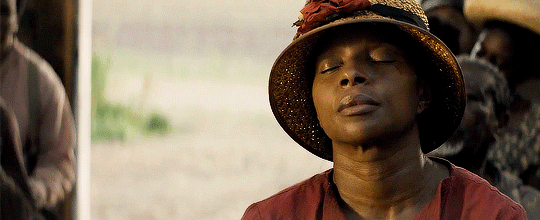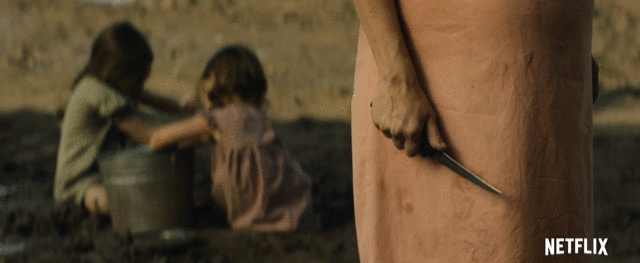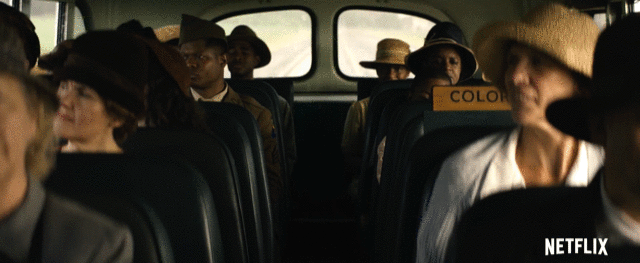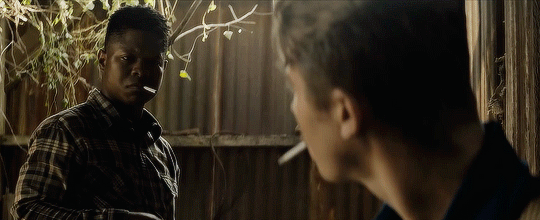*NOTE: This is a reprint of my review from the Sundance Film Festival.*
Dee Rees arrived on the scene at Sundance half a dozen years ago with Pariah, and ever since we've been waiting on pins and needles for her to tackle broader territory. After a short stop at HBO with the acclaimed biopic Bessie, Rees finally brings all of her tremendous promise to bear with Mudbound, a masterful story of racial tension, post-war resentment, and social class that should catapult her into the upper echelon of directors on such weighty material.
An adaptation of Hillary Jordan's novel, the film follows two families in post-WWII Mississippi. The white McAllans have moved from Memphis to Mississippi on the whims of patriarch Henry (Jason Clarke), who up and bought a farm (after first being swindled, proving he's not as smart as he thinks) there without notifying his new bride, Laura (Carey Mulligan). We learn that Laura is an educated woman who was keen to leave the tiny world her upbringing promised. She may not have loved Henry initially, but she was eager to get out so she was "grateful", as she puts it. There's also Henry's younger brother, Jamie (Garrett Hedlund, the best he's EVER been), a writer and Army pilot with a thing for the ladies. At first introduction it's clear he and Laura will have more in common than she ever will with Henry.
Their move could have gone mostly without incident if it weren't for a couple of factors. First is Pappy (Jonathan Banks), an out-and-out racist and damned proud of it. He's the type to make nigger jokes right in front of any black he sees, even one who has just served his country. That leads to the other factor: the Jackson family, who have been renting and working on that farm land for generations. In perfectly-attuned voice-over we hear the father Hap (Rob Morgan) lament that his family has been there so long, toiling away on land that'll never be theres. He longs to buy his own land some day; to take up his wife Florence(Mary J. Blige, never better), their headstrong son Ronsel (Jason Mitchell), and their other kids and find their own piece of the American Dream.
But the dreams of both families are stuck in mud, both literal and figurative. The swampy farmland caused by frequent rains makes life nearly impossible, especially for Laura who has been taken away from her roots and planted in this unfamiliar predicament. It isn't lost that her torment mirrors the plight of blacks everywhere who were stolen away and forced into servitude or economic enslavement. The McAllans and the Jacksons may both be poor trash but society places one above the other regardless, which we see every time Henry treats the Jacksons like his slaves when they are merely his tenants. There's no such thing as refusing a request, even one that puts your own family at risk. It's a choice the Jacksons are frequently forced to make.
The war brings things into balance, at least for Jamie and Ronsel. Jamie finds purpose while Ronsel finds the freedom he couldn't find back home. When they both return, it only causes tensions between the families to escalate. "I'm not used to running from a fight. Not anymore", Ronsel says after taking down a bunch of racists (including Pappy) who could care less about his military service. Meanwhile, Jamie turns to drink to get over the horrible things he saw in the fighting. He and Ronsel bond over their shared experiences, but rather than being a unifying force for the families their friendship instead leads to a horrific act, one that had the audience at our screening in tears and gasping for breath.
Mudbound's strength lies in Rees' unflinching depiction of racial tensions, not just in the South but in the entire country. They corrode everything; family, patriotism, faith,...everything is crushed by hatred's weight and it's something that still resonates today. Confidently capturing a perfect sense of time and mood, Rees blends lovely, lyrical narration with breath-taking cinematography. But perhaps the biggest surprise is how adept she is at bigger scenes on the battlefield, both in the cockpit of Jamie's plane and from inside Ronsel's tank.
From here it looks as if there is very little Rees can't accomplish as a filmmaker, and that includes making the most of her ensemble cast. Having only seen Rob Morgan in smaller roles he is a revelation as the honest and proud Hap, who works his body to the bone on that field to make sure his family is safe and provided for. Mulligan scores again as a woman who is slave to her circumstances, but at times Laura's storyline feels separate from the larger whole. Hedlund, Clarke, and Mitchell add texture to characters that rarely fall into stereotypical patterns. The one exception is Pappy who is every bit the typical sonuvabitch racist he seems to be, complete with KKK pals in white hoods. With Mudbound, Rees shows she has full command of the dramatic strength of such serious content, and how it relates to our world today.
Rating: 4 out of 5



















